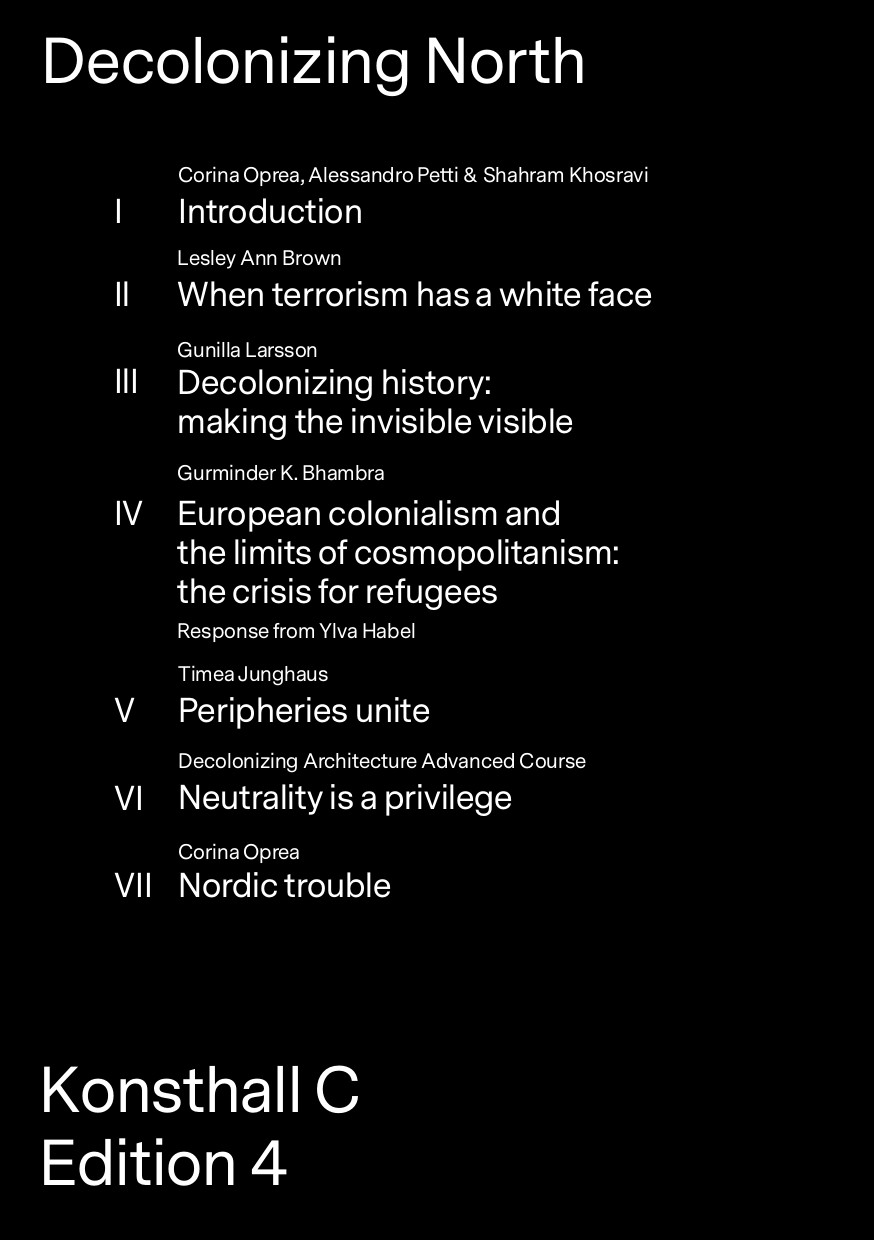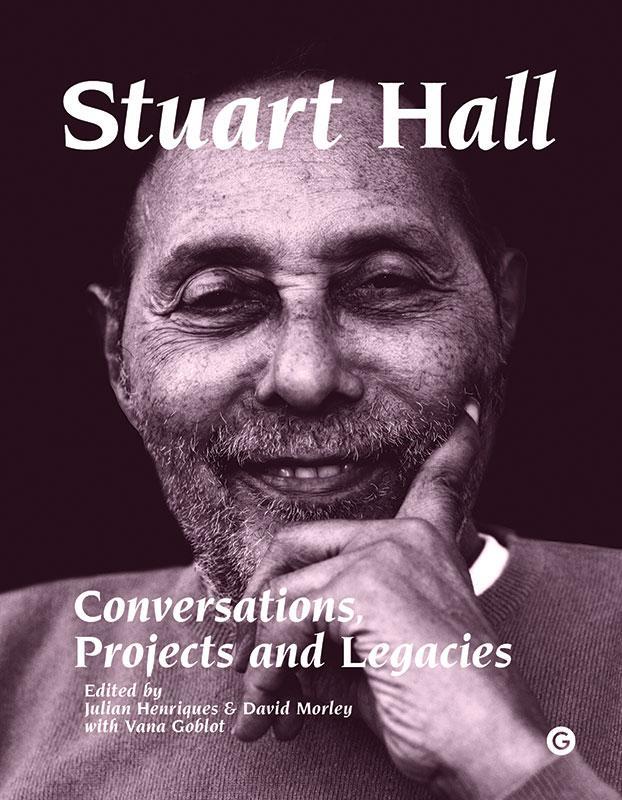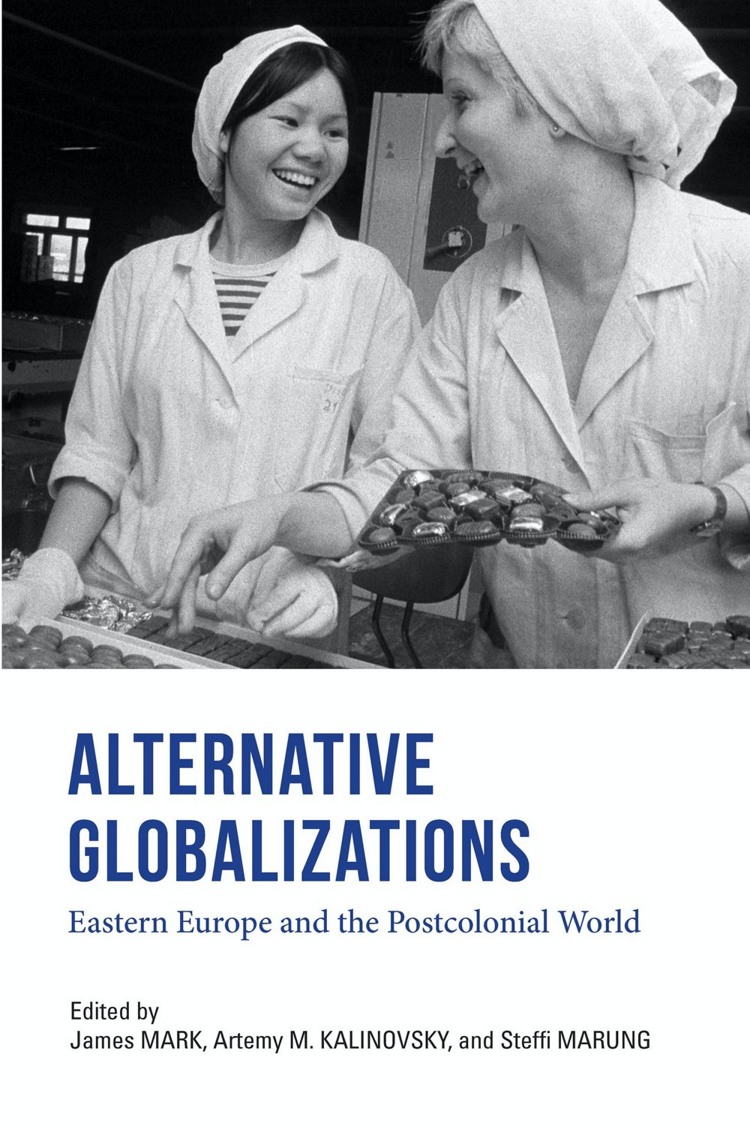Decolonizing North (2018)
Filed under book | Tags: · colonialism, decoloniality, nordics, racism, scandinavia

“The north is not only a geographical expression, it indicates often a power relation based on presumption of superiority. Despite violent border regimes and colonial processes on indigenous populations, northern European countries have scarcely dealt with their self-image of colonial powers. Is decolonization today a possible political project of liberation against this historical prejudice? What is at stake and how should we position ourselves within an imperative process of decolonization in relation to land and knowledge? In particular, how to de-align from the reproduction of oppressive structures and look instead to new alliances between native and migrants’ populations, and towards solidarity practices within art, discourse and immediate locality.
Addressing a range of topics in relation to contemporary colonial forms, inner-nordic colonialization of Sámi and Inuit, reflections on decolonizing terminologies, white supremacy the publication focuses on questions of decoloniality and its meaning for the particularities of North Europe today.”
Contributors: Lesley Ann Brown, Gunilla Larsson, Gurminder K. Bhambra, Ylva Habel, Timea Junghaus, Decolonizing Architecture Advanced Course, Corina Oprea.
Edited by Elof Hellström, Samuel Girma, Corina Oprea, and Alessandro Petti
Publisher Konsthall C, Stockholm, 2017
95 pages
Stuart Hall: Conversations, Projects and Legacies (2017)
Filed under book | Tags: · black people, cultural studies, diaspora, identity, marxism, neoliberalism, politics, racism

This book “examines the career of the cultural studies pioneer, interrogating his influence and revealing lesser-known facets of his work. This collection of essays and photographs evaluates the legacies of his particular brand of cultural studies and demonstrates how other scholars and activists have utilised his thinking in their own research.
Throughout these pages, Hall’s colleagues and long-term collaborators assess his theoretical and methodological standpoints, his commitment to the development of a flexible form of revisionist Marxism, and the contributions of his specific mode of analysis to public debates on Thatcherism, neoliberalism and multiculturalism. North American activist Angela Davis argues that the model of politics, ideology, and race initially developed by Hall and his colleagues in Birmingham continues to resonate when applied to America’s racialized policing. Further essays focus on Hall’s contributions to contemporary political debate as well as questions of race, ethnicity, identity, migrancy and diaspora. Others discuss Hall’s continuing involvement in issues of representation and aesthetics in the visual arts, particularly photography and film.
With contributions from Britain, Europe, East Asia, and North and Latin America, Stuart Hall: Conversations, Projects and Legacies provides a comprehensive look at how, under Hall’s intellectual leadership, British cultural studies transformed itself from a form of ‘local’ knowledge to the international field of study we know today.”
Contributors: John Akomfrah, Avtar Brah, Charlotte Brunsdon, Iain Chambers, Kuan-Hsing Chen, John Clarke, James Curran, Angela Davis, David Edgar, Lawrence Grossberg, Catherine Hall, Dick Hebdige, Tony Jefferson, Robert Lumley, Mahasiddhi (Roy Peters), Doreen Massey, Angela McRobbie, Caspar Melville, Frank Mort, Michael Rustin, Bill Schwarz, Mark Sealy, Liv Sovik, Lola Young.
Edited by Julian Henriques and David Morley with Vana Goblot
Publisher Goldsmiths Press, London, 2017
ISBN 9781906897475, 1906897476
322 pages
Reviews: Ashleigh McFeeters (LSE blogs, 2018), Karen Wilkes (Media Theory, 2019).
PDF (33 MB, updated on 2021-4-13)
PDF (12 MB, accepted manuscript)
James Mark, Artemy Kalinovsky, Steffi Marung (eds.): Alternative Globalizations: Eastern Europe and the Postcolonial World (2020)
Filed under book | Tags: · central europe, china, cold war, decolonization, eastern europe, economy, global south, globalisation, history, internationalism, labour, migration, nationalism, politics, postcolonialism, race, racism, socialism, solidarity, southeastern europe, soviet union

“Globalization has become synonymous with the seemingly unfettered spread of capitalist multinationals, but this focus on the West and western economies ignores the wide variety of globalizing projects that sprang up in the socialist world as a consequence of the end of the European empires. This collection is the first to explore alternative forms of globalization across the socialist world during the Cold War. Gathering the work of established and upcoming scholars of the Soviet Union, Eastern Europe, and China, Alternative Globalizations addresses the new relationships and interconnections which emerged between a decolonizing world in the postwar period and an increasingly internationalist eastern bloc after the death of Stalin. In many cases, the legacies of these former globalizing impulses from the socialist world still exist today. Divided into four sections, the works gathered examine the economic, political, developmental, and cultural aspects of this exchange. In doing so, the authors break new ground in exploring this understudied history of globalization and provide a multifaceted study of an increasing postwar interconnectedness across a socialist world.”
Publisher Indiana University Press, Bloomington, 2020
ISBN 9780253046505, 0253046505
vii+341 pages
Reviews: Jelena Đureinović (Studies of Transition States and Societies, 2020), Markus Sattler (Eurasian Geography and Economics, 2020), Ondřej Bělíček (A2larm, 2020, CZ).
Interviews with co-author (James Mark): Zoltán Ginelli (LeftEast, 2020, Part 2, Part 3).
Project website
Publisher
WorldCat
PDF (7 MB)
Comment (0)
